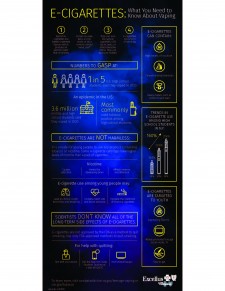
ROCHESTER, N.Y., October 30, 2020 (Newswire.com) - Excellus BlueCross BlueShield is calling attention to the data that young people who vaped were five to seven times more likely to be infected with COVID-19 than those who did not use e-cigarettes, according to a study of young people who were tested for the virus published in The Journal of Adolescent Health in August 2020. Authors of the study attribute the increased risk to the negative impact on the lungs from vaping.
“The U.S. Surgeon General said youth vaping is at epidemic levels, and we agree,” said Gregory Carnevale, M.D., MBA, vice president medical affairs, Medicare and retail markets for Excellus BlueCross BlueShield. In 2020, 3.6 million young people in U.S. currently use e-cigarettes, according to a study conducted earlier this year by the U.S. Centers for Disease Control and Protection. That includes approximately one in five high school students and one in 20 middle school students.
“Many young people believe that e-cigarettes are less harmful than other tobacco products, but they’re wrong,” said Carnevale. E-cigarettes can contain dangerous ingredients such as cancer-causing chemicals, chemicals linked to lung disease, heavy metals, ultrafine particles that can be inhaled deep into the lungs, and high levels of nicotine.
JUUL® is a brand of e-cigarette popular among young people. One study showed that 63 percent of JUUL® users between 15-24 years old didn’t know the product contains nicotine.
“It is unsafe for young people to use any product containing nicotine because it is addictive and can harm the developing brain, affecting memory and attention,” said Carnevale. “Some e-cigarette cartridges have a higher concentration of nicotine than an entire pack of cigarettes.”
Research shows that e-cigarette use by young people can have other health impacts, including chronic cough, chronic bronchitis and wheezing, increased heart rate and blood pressure, and an increased likelihood of smoking traditional cigarettes.
“This new study linking vaping to susceptibility for COVID-19 should be a wake-up call for parents and others to intervene,” said Carnevale.
“‘The Vape Talk’ is an important one for parents to have with their kids,” said Jennifer Sullivan, Manager of Health Promotions for the American Lung Association and Director of the Asthma Coalition of Erie, Monroe & Niagara Counties. “By having an honest and informed discussion you can help keep your child from beginning a lifelong addiction to nicotine – and all the health risks that come with using tobacco products.”
Resources to help someone quit vaping include their own doctor, the American Lung Association at www.lung.org, the NYS Smoker’s Quitline at 1-866-NY-QUITS (1-866-697-8487), www.SmokeFree.gov, and the website The Truth Initiative at www.truthinitiative.org.
Excellus BCBS’s educational infographic, “E-Cigarettes: What You Need to Know About Vaping” is available for free download.
Media Contact: Jim Redmond, (585) 238-4579, jim.redmond@excellus.com
# # #
Excellus BlueCross BlueShield, an independent licensee of the Blue Cross Blue Shield Association, is a nonprofit health plan with 1.5 million upstate New York members. The company’s mission is to help people live healthier and more secure lives through access to high-quality, affordable health care. Its products and services include cost-saving prescription drug discounts, wellness tracking tools and access to telemedicine. With more than 3,500 employees, the company is committed to attracting and retaining a diverse workforce to foster innovation and better serve its members. It also encourages employees to engage in their communities by providing paid volunteer time off as one of many benefits. To learn more, visit ExcellusBCBS.com.
Source: Excellus BlueCross BlueShield
Share:
